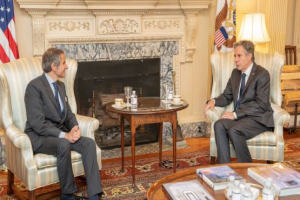
IAEA Director General Rafael Mariano Grossi met US State Secretary Antony Blinken for a comprehensive discussion on a range of critical global security concerns in Washington DC on October 24, 2022. (Photo: F. Everett/State Department)
IAEA inspectors to carry out verification activities at two locations in Ukraine this week
Vienna: The International Atomic Energy Agency (IAEA) Director General Rafael Mariano Grossi has described the nuclear safety and security situation at Europe’s largest Zaporizhzhia Nuclear Power Plant (ZNPP) in Ukraine as “extremely dangerous”.
While there has been no shelling in the area of the ZNPP site over the past week, there have still been military activities in the vicinity of the site. “This is absolutely no time for complacency. The situation could change dramatically at any point” Grossi said yesterday.
Earlier he briefed the United Nations Security Council on October 27, 2022, that progress had been made in high-level consultations with Ukraine and Russia in recent weeks on establishing an “indispensable” nuclear safety and security protection zone around the ZNPP. He said “we’re not far from” an agreement and “it is in no one’s interest to have a major nuclear accident.”
Yesterday though, citing information from the IAEA experts present at the site, he said the nuclear safety and security situation at the ZNPP remained “precarious”, even as the plant over the past ten days received the power it needs for reactor cooling and other essential safety and security functions directly and without interruption from the national grid. He reiterated that engineers at ZNPP were working to stabilize the facility’s fragile external power supplies following repeated outages earlier this month that forced it to temporarily rely on its emergency diesel generators for electricity.
He said the switchyard of the nearby thermal power station, which was damaged by shelling on October 19, 2022, was repaired the following day and would provide backup power if needed.
Grossi still stressed that the ZNPP’s power situation remained vulnerable – only one 750 kV external power line is operating compared with four before the current military conflict in Ukraine – and could deteriorate at any moment.
Earlier this month, the ZNPP’s connection to the 750 kV line was cut three times in ten days, with the last such power loss occurring on October 17, 2022. During two of those off-site power cuts, the plant’s emergency diesel generators provided the required electricity, as the backup system was also down.
The ZNPP site has been controlled by Russian forces since March 2022. Until recently, operational decisions were taken by its Ukraine staff, but Russia announced it had taken control of the facility and was now taking those decisions. In recent months the site had been beset with power outages caused by shelling, putting nuclear safety and security at the plant at risk.
Separately, Grossi also stated yesterday that this week the IAEA inspectors would carry out verification activities at two locations in Ukraine, following a written request from the Ukraine government to send teams of inspectors there.
Ukraine’s request was issued after the Russian Federation made allegations about activities related to the possible production of “dirty bombs” at the two locations, which are under IAEA safeguards and have been visited regularly by IAEA inspectors. The purpose of this week’s safeguards visits is to detect any possible undeclared nuclear activities and materials related to the development of “dirty bombs”. The IAEA inspected one of the two locations a month ago and no undeclared nuclear activities or materials were found there.
“The IAEA inspectors will conduct independent verification at these locations in accordance with Ukraine’s safeguards agreement to detect any diversion of nuclear material under safeguards, any undeclared production or processing of nuclear material at the two locations and assure that there are no undeclared nuclear material and activities,” Grossi said. “As soon as our verifications are completed, we will assess the findings and report our conclusions in line with our standard safeguards practice. However, knowing the interest and urgency of this matter, the Agency will also provide our conclusions to the IAEA Board of Governors and immediately after to the public,” he added.
– global bihari bureau





